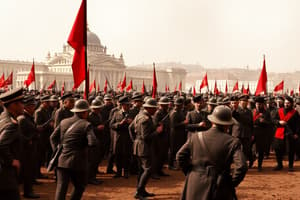Podcast
Questions and Answers
What are the four long-term causes of World War I?
What are the four long-term causes of World War I?
- Alliances, nationalism, militarism, and imperialism (correct)
- Isolationism, global trade, cultural exchange, and political reforms
- Treaties, colonialism, industrialization, and revolution
- Religious conflicts, economic competition, territorial disputes, and technological advancements
Who was the Archduke whose assassination is considered the spark that started World War I?
Who was the Archduke whose assassination is considered the spark that started World War I?
- Archduke Leopold von Habsburg
- Archduke Wilhelm III
- Archduke Franz Ferdinand (correct)
- Archduke Maximilian Joseph
Which area is known as the Balkans, and was a point of contention among various powers?
Which area is known as the Balkans, and was a point of contention among various powers?
- France, Belgium, Luxembourg, and Netherlands
- Serbia, Bosnia-Herzegovina, Montenegro, and Greece (correct)
- Poland, Ukraine, Belarus, and Lithuania
- Italy, Austria, Hungary, and Romania
When did declarations of war start coming after the assassination of Archduke Ferdinand?
When did declarations of war start coming after the assassination of Archduke Ferdinand?
Which governing power was next in line for the Austro-Hungarian Empire before the assassination of Archduke Ferdinand?
Which governing power was next in line for the Austro-Hungarian Empire before the assassination of Archduke Ferdinand?
What was the nickname given to World War I?
What was the nickname given to World War I?
How many soldiers and civilians died during World War I?
How many soldiers and civilians died during World War I?
What was the name of the two sides involved in World War I?
What was the name of the two sides involved in World War I?
What led to tension among countries due to increased military spending and recruitment?
What led to tension among countries due to increased military spending and recruitment?
What significant rise in the 19th century involved countries using military and bureaucratic power to influence others for economic, ideological, and political gains?
What significant rise in the 19th century involved countries using military and bureaucratic power to influence others for economic, ideological, and political gains?
What caused Austria-Hungary to declare war on Serbia, prompting Russia's preparation to support Serbia?
What caused Austria-Hungary to declare war on Serbia, prompting Russia's preparation to support Serbia?
What led to questions about reorganizing and drawing boundaries for new governments in the early 1800s?
What led to questions about reorganizing and drawing boundaries for new governments in the early 1800s?
What inspired Europeans, leading to more closely aligned national and cultural borders?
What inspired Europeans, leading to more closely aligned national and cultural borders?
What led to increased hostilities as European powers competed for territory and control in China, Japan, and Africa?
What led to increased hostilities as European powers competed for territory and control in China, Japan, and Africa?
What created rules for European powers to claim territory in Africa, contributing to tensions among them?
What created rules for European powers to claim territory in Africa, contributing to tensions among them?
What led to Great Britain and France joining Russia's side in World War I?
What led to Great Britain and France joining Russia's side in World War I?
What was a significant factor contributing to the tension among countries in the late 19th and early 20th centuries?
What was a significant factor contributing to the tension among countries in the late 19th and early 20th centuries?
What was the main purpose of the Berlin Conference in 1884-1885?
What was the main purpose of the Berlin Conference in 1884-1885?
What inspired Europeans and led to more closely aligned national and cultural borders?
What inspired Europeans and led to more closely aligned national and cultural borders?
What was a consequence of European powers controlling 90% of African territory by 1914?
What was a consequence of European powers controlling 90% of African territory by 1914?
What was the main reason for the formation of alliances between governments in Europe?
What was the main reason for the formation of alliances between governments in Europe?
What led to an arms race in the late 1800s and early 1900s?
What led to an arms race in the late 1800s and early 1900s?
What was a key characteristic of imperialism in the late 19th century?
What was a key characteristic of imperialism in the late 19th century?
Flashcards are hidden until you start studying
Study Notes
Causes of World War I
- Austria-Hungary declared war on Serbia, prompting Russia's preparation to support Serbia
- Germany mobilized troops to support Austria-Hungary, leading Great Britain and France to join Russia's side
- Napoleon's conquests in the early 1800s led to questions about reorganizing and drawing boundaries for new governments
- Alliances between governments in Europe were formed to protect military, political, or economic interests
- The Triple Entente (Russia, Great Britain, and France) and the Triple Alliance (Austria-Hungary, Germany, and Italy) were the two sides involved in World War I
- Nationalism and the growing independence in the Balkans inspired Europeans, leading to more closely aligned national and cultural borders
- Militarism, seen in the late 19th and early 20th centuries, led to tension among countries due to increased military spending and recruitment
- World War I saw the use of new weapons due to an arms race in the late 1800s and early 1900s
- Imperialism, involving countries using military and bureaucratic power to influence others for economic, ideological, and political gains, saw a significant rise in the 19th century
- European powers competed for territory and control in China, Japan, and Africa, leading to increased hostilities
- European powers controlled 90% of African territory by 1914, leading to several wars and crises in Africa between 1885 and 1914
- The Berlin Conference in 1884-1885 created rules for European powers to claim territory in Africa, contributing to tensions among them
Studying That Suits You
Use AI to generate personalized quizzes and flashcards to suit your learning preferences.




